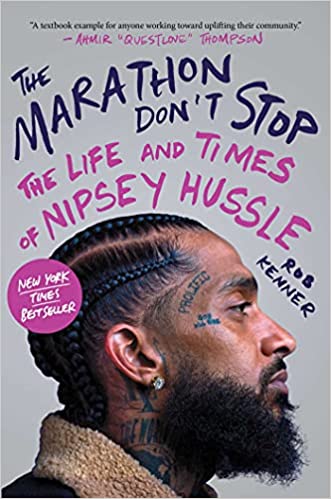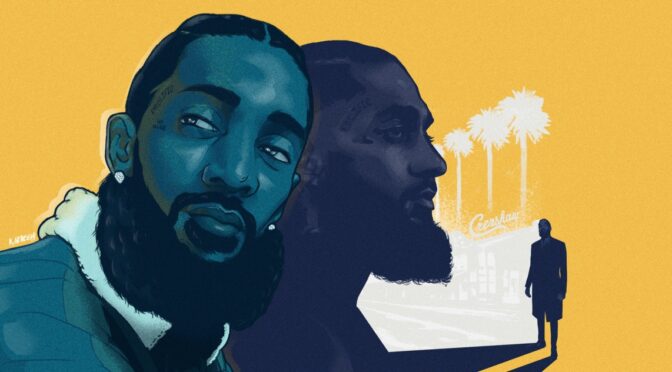Rob Kenner, New York Times best-selling author of the Marathon Don't Stop: The Life and Times of Nipsey Hussle shares the principles that, Nipsey Hussle, advocated in his music and in his daily life and work. Nipsey's music on self-empowerment, economic independence, owning your own intellectual property, owning real estate investments, financial literacy and also just supporting people who support you.
Rob – The reason that I wrote the book and called it The Marathon Don't Stop is because I believe that, Nipsy Hussle, is one of the most important and misunderstood artists in the history of, hip-hop.
Download and listen to the full interview here:
Introduction to Nipsey Hussle
Rob is going to share the life of the Man, Nipsey Hussle, not just the artist. Nipsey Hussle, was more than a rapper, this young man was instrumental in a lot of things: building up his community and giving back among other things. Rob is going to expand on our knowledge of both the, hip-hop, artist and, Nipsey Hussle, life and legacy.
I must confess that I did not know of, Nipsey Hussle, until he was murdered and the whole world was talking about him. My generation is not necessarily a rap or a, hip-hop, kind of generation, my generation is the R&B soul generation. Rob on the other hand is intimately connected with, hip-hop, and its culture.

Bio of Rob Kenner New York Times Best Selling Author
Rob Kenner is one of the most prolific and influential voices in, hip hop, publishing. A founding editor of Vibe, Kenner joined the start-up team of Quincy Jones’ groundbreaking, hip hop, monthly in 1992. During a nineteen-year run at Vibe, he edited and wrote cover and feature stories on iconic cultural figures ranging from Tupac Shakur to Barack Obama as well as writing the acclaimed column Boomshots.
Kenner’s writing has appeared in Complex, Genius, Mass Appeal, Pigeons & Planes, Ego Trip, Poetry magazine, The New York Times, and Billboard. He’s also produced and directed documentary shorts on the likes of De La Soul, Nas, and Post Malone. As an editor at Vibe Books, Kenner worked on the New York Times bestseller Tupac Shakur and contributed to The Vibe History of Hip Hop. He went on to co-author VX: 10 Years of Vibe Photography and produced the book Unbelievable, a biography of The Notorious B.I.G. by Cheo Hodari Coker which was optioned for the motion picture Notorious. His latest book is a New York Times Best seller “The Marathon Don't Stop: The Life and Times of Nipsey Hussle.
Myrna – I was reading your press releases, I understand that you met, Nipsey Hussle, about 10 years ago at, Vibe. What impressed you most about the man back then?
Nipsey Hustle Hip Hop Music
Rob – Nipsey Hussle, had just released one of his first major mixtapes a project called Bullets Ain't Got No Name and he was very excited to come up to the office of, vibe magazine, and presented it to the staff. I learned later in the process of researching my book The Marathon Don't Stop, he had been submitting his demo and photo to the magazine for some time hoping to be featured in our “next section”, which is a platform for new artists. People like Jay-z and Biggie and Mary J Blige got their first break at, Vibe, by being featured in the “next section” at, Vibe.
Nipsey's goal was be featured in that section but, honestly where he was in his career at that moment he was not really on our radar yet. He was an unsigned artist so, and he was first sending those demos in, but like every goal he ever set for himself in life. He set a very high goal and although he did not achieve his goal right away he persisted. Nipsey Hussle, just kept at it and did not give up and by God he made it into the office of, Vibe, by 2009 and presented his mixtape to the Staff.
I was impressed by his charisma, his energy, his personal magnetism. I remember the man who walked into the conference room that day. His braids immaculately done and his outfit on point, his gold chain was shining, and he was very proud to be presenting his music. When he pressed play, it was powerful stuff.
We had worked on the first cover story for Snoop Dogg back in 1993 and so I personally had a strong sense of déjà vu. Nipsey Hussle, was coming from Los Angeles and giving that really hard West Coast sound. One of the tracks on the tape he was rapping over a famous Dr Dre beat the song Gin and Juice. You have to come correct if you are going to record to that beat. It was very impressive to me.
Vibe Magazine featured New Hip Hop Artists in their Next Section
After he played all of his music, I took him aside and I said, “keep doing what you're doing” In fact he did get his one-page write-up at, Vibe, shortly before the magazine folded or seized print publication. Vibe, did transition to a digital publisher online magazine. Over time everything he did was special, he was just doing things differently.
He was changing the game in terms of his business strategy and as I would learn later his commitment to his community and to all the people that were helping him build his movement.
So, that was that was the first impression and it stuck with me.
Myrna – I was very impressed motivate and hustle official video. Loved the music, it had close to 63 million views. Hip hop has a large audience.
Can you tell us why you wrote the book “The Marathon Don’t Stop?” I know that a couple of Nipsey’s mix tapes were called, Marathon. What does that really mean and why did you choose it as a title of your book?
The Marathon Continues
Rob – Marathon, and, The Marathon Continues, is a kind of motto for his fans especially after his tragic passing. Kind of a rallying cry to make sure that all of the things that, Nipsey Hussle, stands for to continue. All of the principles that he advocated in his music and in his interviews and in his daily life and his work which have to do with self-empowerment, economic independence, owning your own intellectual property, owning real estate investments, financial literacy and also just supporting people who support you.
The reason that I wrote the book and called it The Marathon Don't Stop is because I believe that, Nipsy Hussle, is one of the most important and misunderstood artists in the history of, hip-hop.
As you mentioned he was a businessman, entrepreneur, leader, and an activist. He really identified strongly with civil rights leaders.
In the latest song which was released after his passing is a track called What It Feels Like featuring Jay-z and, Nipsy Hussle, on the same track. This track was used for soundtrack to the film Judas and the Black Messiah. Nipsy often referred to himself as young, Malcolm X.
He wore a, Malcolm X, pendant which his brother had made custom for himself and then let Nipsey keep when he was going away to prison for some time.

Nipsey Hussle was more than a Hip Hop Artist
I think he saw himself as much more than an entertainer, he was someone committed to the upliftment and full respect of his community. I think that is one of the reasons why this book was so important. You are not the only person who's told me that you were unaware of what Nipsey was doing until you tuned into his Staples Center memorial service where 20,000 thousand people were all on their feet mourning him and celebrating his life.
President Obama wrote him a letter of tribute for that ceremony. Stevie Wonder sang at the funeral, Snoop Dogg eulogized him and of course his beloved Lauren London delivered a very moving tribute.
He had a family-owned business which was called All Money and No Money.
He and his brother also had a successful clothing store called the, Marathon, clothing which they built right in the same shopping plaza where he used to sell his mixtapes hand-to-hand right there on Slauson and Crenshaw.
He always talks about that intersection in his music.
Myrna – Yes, I noticed he's got a title called Crenshaw.
Nipsey Hussle The Marathon Continues
Rob – That was a groundbreaking mixtape The Crankshaft Project, I would say for the rap industry that was the moment that if you were not paying attention to, Nipsey Hussle, everybody woke up at that moment because he had the ambitious idea of selling his mixtape for a hundred dollars.
The Crenshaw tape by that point he had put out a few free mixtapes and built up quite a loyal fan base, the Crenshaw actually came after the, Marathon, tape and, marathon continues, so those tapes expressed his vision of the, marathon, which was a long-term view. Viewing life as a, Marathon, you don't give up just because you're behind in the first lap. The, marathon, is not a team sport, other people can be cheering for you, you can practice together; but nobody else can run your race.
Nipsey, understood that and he used that concept of the, marathon, to um encourage himself when he was down, when there were setbacks in his path. There were quite a few which you can get into in the book in detail; but he withstood tremendous pressure from a neighborhood that was extremely volatile. There was a very hostile relationship between the police and the members of the community. There was a strong gang culture which, Nipsey Hussle, eventually became involved in. His life was filled with challenges, he was someone that had unlimited potential, but huge obstacles, seemingly unsurmountable obstacles.

Nipsey Hussle an Activist for change
People were paying attention to his work and what he stood for and the principles that he lived by. That is why the book is called The Marathon Don't Stop, because Nipsy Hussle’s movement has not stopped. He has been a steady presence in all the conversations about race in America. His face has been on murals all around the world, his music was streamed millions of times on election day 2020.
He had a very important song called FBT, I’m not sure if you listen to that one; but the initials are a rebuke of president Donald Trump.
Hip-hop, I believe helped to mobilize the vote which brought President Obama into office, but after eight years of Obama, Donald Trump was presenting kind of a backlash and playing on racial divisions. I think, Nipsey Hussle, deserves credit for recognizing the power of, hip-hop, to speak to the moment in terms of social and political issues.

https://www.buzzsprout.com/1761155/podcast/embed
Nipsey Hussle and Tupak Shakur
Myrna – You also make a comparison between, Nipsey Hussle, and, Tupac Shakur, what are the similarities between these two, hip hop, artists?
Rob – I wasn't the first one to compare Nipsey to Tupac, he actually called himself the Tupac of his generation. The album Victory Lap which was his major label debut, has a line that states this. I did an in-depth interview with him I asked him about that line in the song, because that's a big statement.
I said you're calling yourself the Tupac of your generation, what do you mean by that?
He replied that to him, Tupac was a trojan horse for the streets. He had so much more going on inside of him than his thug life image would suggest. He was actually a very intelligent and sensitive person with a lot of different talents and qualities, that he didn't necessarily
present at all times.

The Marathon Don't Stop: The Life and Times of Nipsey Hussle
The focus of the book is about a triumph rather than a tragedy. I want to focus on the message and the movement and the, marathon, rather than this atrocity that took place.
Myrna – I want to talk about, hip-hop, because I had to do some research for this interview to understand what it really is. I know that you're intimately connected with, hip hop, and rapping is a little different from, hip-hop, but why has, hip-hop, become this lifestyle and culture of the young generation? It’s not even a race thing, because it covers all races.
Rob – We're actually coming up on the 50th anniversary of what is considered the birth of, hip-hop. Hip Hop, started in the Bronx. It was never about negative forces, but a way to escape the struggles of life in the Bronx. The Bronx was an urban wasteland and, hip-hop, grew and evolved into a multi-billion dollar industry.
It affects every aspect of pop culture from fashion to language to politics. Everything now is influenced by, hip-hop. Quincy Jones who founded, Vibe magazine, understood the bebop generation as the coolest thing that ever-hit music. He saw, hip-hop, artists in their earliest stages of the development of that culture and he recognized a kindred spirit there.
The Origin of Hip Hop
Hip Hop, has become multi-racial and multicultural, in the early days in the Bronx it's important to remember there were all kinds of kids involved. Puerto Rican, Dominican kids dancing, break dancing, painting graffiti. Hip hop, is a lifestyle it's not just rap music, which is one aspect of it the DJ and the MC.
There are multiple aspects to, hip hop, it's become the most powerful and popular form of entertainment in the world.
Conclusion
Myrna – Tell our listeners how they can get pick up a copy of your book The Marathon Don't Stop: The Life and Times of Nipsey Hussle. Also tell us about Vibe, I know it started off as a magazine, what do you guys do now?
Rob – Well, Vibe, was founded by Quincy Jones back in 1992. I joined the startup staff in 93, Quincy had a good idea that we should do this and so I ended up working at, Vibe, for 17 years. I was the only editor who started from the startup staff and stayed all the way until the very last day when you know the magazine had to be shut down.
Quincy had moved on and the ownership had changed hands, it's a long story, but the bank basically repossessed the investment. The website www.vibe.com is the digital version of, Vibe. It's a very important publication and became the definitive publication for, hip-hop, culture in terms of excellent photography and excellent journalism.
We had some of the most talented writers and photographers of this generation working at the Magazine. Vive.com has gone on because it needs to go on. It still holds up a standard of excellence in terms of discussing all the aspects of, hip-hop, culture and lifestyle.

Additional Resources
How to Rewrite Your Life Story and Achieve Organizational Wellness

